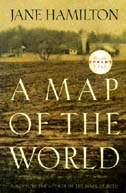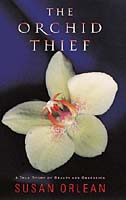|


Comment
on this story
|
|

The dark side of maps and flowers
by Jeanne McDonald
In Jane Hamilton's pensive and sumptuous novel, A Map of the World (Anchor, $12.95), Alice Goodwin, the lovable but slightly off-center wife of a Wisconsin dairy farmer, happens across a drawing she had made as a child. Her map of the world is a place of beauty and serenity, with "lime-green forests...meandering dark blue rivers, [and]...pointy lavender mountain ranges." But only minutes after rediscovering her drawing, Alice finds her real world shattered—first, by the accidental death of Lizzie, a friend's child left in Alice's care, and a few days later, by accusations of child abuse that land her in jail.
Hamilton tells her wrenching story in Alice's voice in the first and last sections of the book and in Alice's husband Howard's in the middle, revealing to the reader more about the characters than they know about each other. But nobody knows Howard better than Alice, and nobody knows Alice better than herself. "I had been brought up to be off-balance and was," she claims. "I yearned to keep myself straight and in order, but of course never could." But while she demeans herself, she paints Howard lovingly: "...[T]hrough the house his scent seemed always to be warm. His was a musky smell, as if the source of a muddy river, the Nile or the Mississippi, began right in his armpits."
Howard's forbearance is a dramatic counterpoint to Alice's unpredictability. Even in jail, where she awaits trial because Howard can't raise her bail, her behavior is enigmatic. Maliciously beaten by another inmate, she passively submits to the blows in order to pay her "pound of flesh for Lizzie."
The beauty of Jane Hamilton's luxuriant and persuasive writing—or perhaps the agony of it—is that we can't stop reading. We must stay with Alice throughout all of her Job-like trials, because she has lost everything else—her two daughters, her farm, her reputation, her only friend, and, in a sense, her husband's fidelity. Reading this novel inflicts upon the reader an exquisite pain, but this is in no sense an issue book. Rather, it illustrates how a good woman's world can suddenly be turned upside down, and how, from that dizzying perspective, her own disequilibrium and despair can drive her to cry to the police who come to arrest her: "I hurt everyone."
The book opens with Alice's chilling observation: "I used to think if you fell from grace it was more likely than not the result of one stupendous error, or else an unfortunate accident. I hadn't learned that it can happen so gradually you don't lose your stomach or hurt yourself in the landing." But Alice eventually realizes that forgiveness—for herself and the people who have wounded her—is her only hope for readjustment in the world. "I had that miraculous clarity for an instant," she says, "and so I understood that the forgiveness itself was strong, durable, like strands of a web, weaving around us, holding us."
It's an entirely different world we're thrown into in Susan Orlean's consuming nonfiction story, The Orchid Thief, (Ballantine, $14), and at first it's hard to pinpoint the main character. Is it the charming but oily John Laroche, a.k.a. the orchid thief, or is it Orlean herself? Ultimately it turns out to be the elusive and alluring wild orchid, for which obsessed collectors have killed others and themselves, have lied, stolen, have braved quicksand and hostile natives, have slogged miles and miles in the "green hell" of dripping jungles, slimy swamps, and steamy forests. "The hours I spent in the Fakahatchee," says Orlean,"...were probably the most miserable I have spent in my entire life. The swampy part...is hot and wet and buggy and full of cottonmouth snakes and diamondback rattlers and alligators and snapping turtles and poisonous plants and wild hogs and things that stick into you and on you and fly into your nose and eyes...and the air has the slack, drapey weight of wet velvet." That description gives you an idea of the fresh and vivid images Orlean tosses out page after page. A staff writer for the New Yorker, Orlean smelled a good story in a Naples, Florida, newspaper account involving a white man (Laroche) and three Seminole Indians accused of stealing orchids from the Fakahatchee Strand State Preserve, supposedly for the purpose of cloning. In tracking the story, Orlean ends up writing almost, but not quite, everything you ever wanted to know about orchids, Laroche, Osceola, the Seminoles, land schemes, cross-fertilization, wetlands, obsession, smuggling, and endangered species legislation. She also throws in lots of ordinary overheard conversations and random events. Her writing is so engaging that when the book ends, you're hungry to know even more about orchids. So to ease your separation anxiety, do what I did: Buy yourself a gorgeous Phalaenopsis and start feeding your own Orlean-spawned obsession.

March 16, 2000 * Vol. 10, No. 11
© 2000 Metro Pulse
|